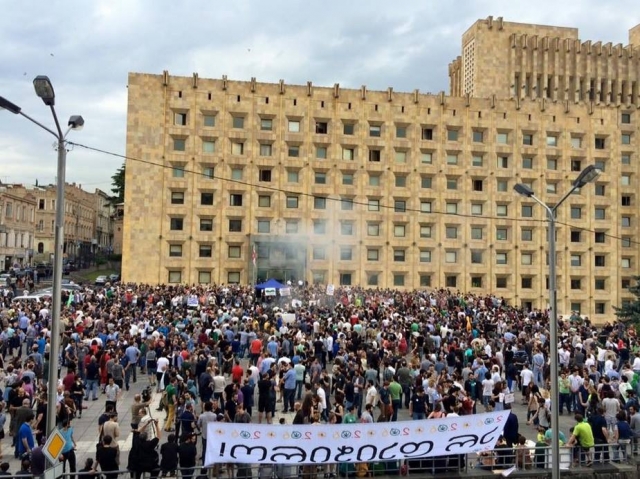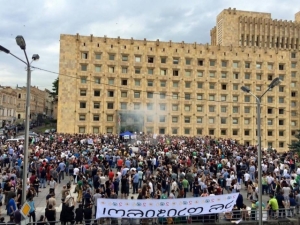2.06: Don’t Arrest!
On June 2nd a demonstration was held next to Georgia’s Government Chancellery in Tbilisi demanding the decriminalization of marijuana. The protesters demanded authorities to stop detaining people for using marijuana and to stop forced drug testing.
“We demand the government to make a change to legislation from which citizens will not bear criminal responsibility as a result of using cannabis or any products derived from it,” stated the organizers. “We don’t want the existence of such a drug legislation which denies fundamental human rights, does not respond to the challenges of modern civilization and is inhuman. Once again we ask the government to stop persecuting people because of marijuana use.”
The Prime Minister of Georgia is still against the decriminalization. “We must discuss how to create a better, happier and a stronger future for our youth. We must care about their way of life,” Garibashvili said. . “Now they demand decriminalization, then they will demand legalization and it will bring tragic results. I am categorically against it.”
Yet it seemd the PM is in the minority against many politicians, narcologists and foreign specialists.
Goga Khachidze an independent MP and the person whose initiative it was to decriminalize maijuana, states that the main goal is to stop prosecuting people for using the soft drug. The initiative for the bill was registered by independent MP Khachidze on 28th of May. Leqso Machavariani the organizer of the demonstration states that the goal is not to legalize smoking marijuana in the street but to stop arresting people for smoking it.
Ex-Prime Minister Bidzina Ivanishvili also commented on the issue, suggesting that the Georgian parliament should consider Europe’s experience.
The Netherlands has also been dealing with the problem of soft drugs and one could safely conclude that it is becoming increasingly less tolerant on the issue. So, while many Georgians try hopelessly to progress in their efforts to decriminalize marijuana, while generating a lot of negative reactions, the Netherlands has been reversing the progress. Across several cities, particularly in the south, foreigners and tourists are no longer permitted to buy cannabis in the legendary authorized cafes known as “coffee shops.”
Last month, Amsterdam’s Mayor was cleared by the Court of Justice for banning marijuana cafes in the famous Red Light District which had triggered intense debate nationwide and protests from “coffee shop” owners. Both marijuana and the Red Light District are major issues in Amsterdam and also major tourist attractions. It won’t end well for the initiative in Georgia if a country with an international reputation for tolerance and a freewheeling lifestyle begins closing the infamous “coffee shops”. Technically, marijuana is illegal in the Netherlands but possession of small amounts is not prosecuted. There are some 700 “coffee shops” in the country.
Defenders of total legalization make an economic argument. Between taxes, tax on profits and money spent by foreign tourists, economists have calculated that the government could make between EURO 650 million and EURO 1.05 billion. And so the debate goes on.
George Abashvili












